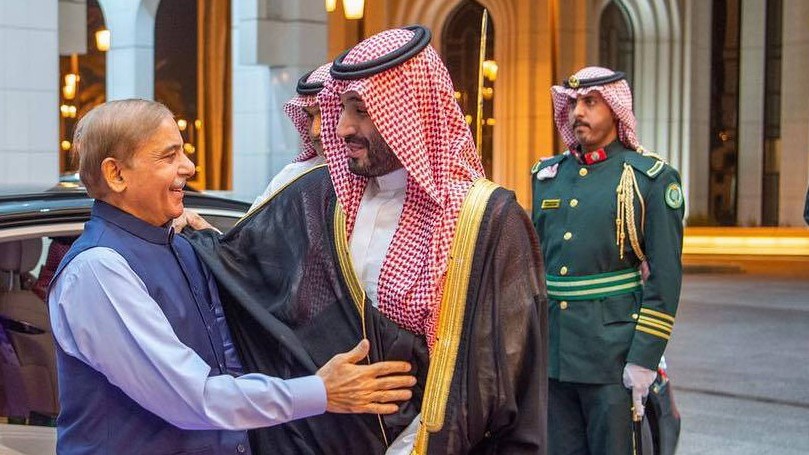Why Saudi Arabia has left Pakistan out in the cold
Unless Islamabad undertakes structural economic reforms and addresses ongoing political instability, Riyadh is unlikely to play saviour this time around

www.middleeasteye.net
Unless Islamabad undertakes structural economic reforms and addresses ongoing political instability, Riyadh is unlikely to play saviour this time around
The
removal of Imran Khan as Pakistan's prime minister in April 2022 ushered in a political crisis, and a year since his departure, it shows no signs of abating.
The political upheaval in Islamabad has transformed into a major cataclysm, with impacts on the country’s political, economic and social life. And as
Pakistan teeters on the edge of
financial default, its traditional partners are not coming to the rescue.
Khan was ultimately removed from power through a no-confidence vote in parliament after a dispute with Pakistan’s
army chief over the removal of his favoured intelligence chief. Having also
refused to allow the
US to use Afghan bases for operations in the country, Khan had become a liability for Pakistan’s military establishment.
After his removal,
mass demonstrations erupted across Pakistan, alongside rare protests in
Arab Gulf states, indicating that Khan’s voting base remained solidly behind him.
Meanwhile, the coalition government that replaced him, under the leadership of Prime Minister Shehbaz Sharif and with the military’s backing, fell deeper into the throes of a financial crisis - and the International Monetary Fund (IMF) has
delayed a multibillion-dollar bailout.
It was expected that the Sharif government, considered more acceptable to global and regional stakeholders, would be able to secure substantial financial grants from states such as
Saudi Arabia, the
UAE and
Qatar.
These assumptions were not baseless, as the
Sharif family has close ties with the Saudi royals. Former Prime Minister Nawaz Sharif spent his political exile in the kingdom after Pakistan’s 1999 military coup. Unlike Khan, whose attempts to project himself as a leader of the Muslim world put him in Riyadh’s crosshairs, Shehbaz Sharif was expected to be politically servile to the kingdom.
Mounting costs
Many believed this political docility and Sharif’s personal links to Gulf royals would eventually be enough for Pakistan to secure crucial financial aid - but so far, this has not been the case. So why are Arab Gulf states, and in particular Saudi Arabia, reluctant to step in?
Over the past decade, Saudi Arabia has provided Pakistan with several financial bailouts, including a
$1.5bn loan in 2014, a
$3bn deposit in 2018, and another $3bn in 2021, among other aid. A year ago, Sharif’s new government approached Saudi Arabia for a new support package, and last August, Riyadh
opted to renew $3bn in deposits as Pakistan continued IMF negotiations.
But after Pakistan failed to reach a final agreement with the IMF, no fresh bailout package was initiated by the Saudis. Last November, General Asim Munir assumed command of the Pakistani military, and he swiftly visited Saudi Arabia; following his trip, reports emerged that the Gulf state was considering increasing its deposits in Pakistan’s central bank
to $5bn and making other investments in the country. But beyond a recent
$1bn oil-sector deal, little has materialised.
The reasons for Saudi Arabia’s wariness cut across political, economic and geostrategic domains. While Riyadh has long been a source of financial support for Pakistan, the latter’s economic crisis has only worsened, and subsequent governments have appeared reluctant to fully implement IMF reforms, owing to their inherent political costs.
This has raised questions within Saudi decision-making quarters over the wisdom of repeatedly salvaging Pakistan’s economy. At the same time, Saudi Arabia’s
no-strings approach to foreign aid is changing in general, and the kingdom has been in talks with international financial institutions on new ways to support cash-strapped states such as Pakistan.
It is becoming evident that fiscal belt-tightening and improved governance practices are no longer just the IMF’s demands, but also Saudi Arabia’s aid conditions vis-a-vis Pakistan.
Political instability
There is also a political dimension to the Saudi disinclination towards providing financial assistance to Pakistan. Since his removal from power, Khan has continued to gain ground against the current government, with a recent poll putting his
popularity at 61 percent, compared with just 32 percent for the incumbent prime minister.
As the federal government tries to avoid
holding elections in key provinces, and as the
targeting of politicians and political workers. by authorities continues, political instability is a given. The
emphasis by a former Saudi ambassador to Pakistan on the link between political and economic stability further suggests that renewed financial engagement hinges on a rapprochement between various political players and state institutions.
The Saudi-Pakistani relationship also has a geostrategic angle. The two countries maintain close defence ties, and their armed forces routinely hold
joint exercises. Pakistan has also deployed soldiers to Saudi Arabia in training and advisory roles. In this way, Pakistan continues to contribute in an indirect manner towards Saudi national security.
Still, Pakistan’s defence engagement with Saudi Arabia has increasingly become low-key and more of tactical significance - a far cry from its military presence within the kingdom during the
Iran-Iraq War.
Thus, even as Saudi Arabia recently deposited
$1bn and
$5bn respectively in the central banks of
Yemen and
Turkey out of geostrategic sensitivities - and in disregard of its newly adopted foreign aid approach - there remains little appetite within Saudi decision-making quarters to dole out similar aid to Pakistan.
In addition, the newly minted
rapprochement between Riyadh and Tehran will reduce Saudi Arabia’s need for such security dependency.
Unless Pakistan undertakes structural economic reforms, implements IMF-approved financial policies and fixes the country’s ongoing political instability, the possibility of renewed Saudi financial support remains relatively low.
The views expressed in this article belong to the author and do not necessarily reflect the editorial policy of Middle East Eye.








